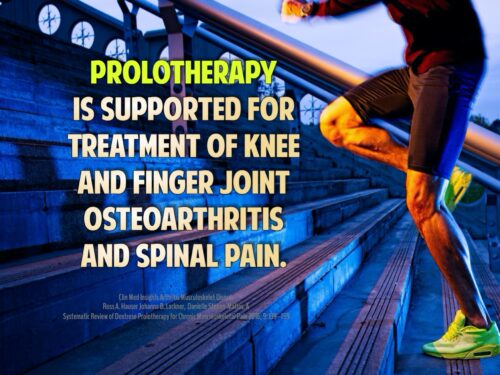The knee is one of the most crucial joints in the body. To be engaged in everyday activities — standing, walking, running, and even lying down — you need to have normal knee function. But if you have chronic pain in your knee, you are prevented from doing all of that and more. Moreover, many conventional treatments include surgery, arthroscopy, cortisone, and NSAIDS, but sometimes those treatments can hurt more than they help. That is why so many people turn to Regenerative Orthopedics to treat persistent joint pain.
Schedule Your Appointment Today!
The knee begins at the lower end of the thigh bone (femur), which rotates on the shin’s upper end (tibia). The knee cap (patellae) slides in a groove on the end of the femur. Large ligaments attach the femur to the tibia, providing stability to the leg.
Common causes of knee pain are arthritis. For example, if you are experiencing minor pain, clicking, giving way, or ‘trick knee,’ you may be feeling the first symptoms of arthritis. Plus, arthritis can begin in people as early as thirty years of age. And this may progress for years before symptoms appear. Acute knee pain, sudden and intense, is usually the result of an injury. Acute knee pain, accompanied by significant inflammation and swelling, can be caused by gout or even infection.
The most common cause of long-lasting or chronic knee pain is osteoarthritis. And other forms of arthritis, rheumatoid, traumatic, and gouty, can also cause chronic pain in the knee joint. Additionally, pseudogout, bursitis, tendonitis, sports injuries, degenerative joint disease, and chondromalacia patellae can also cause knee pain. As we age, the smooth and resilient cartilage on our long bones’ ends wears down, but this cartilage is needed for normal joint function.
Many patients come to us tired of ‘managing’ their chronic pain with NSAID or narcotic medications, various therapies, and exercises. In many cases, these methods do not take care of the cause of the pain.
Patients with pain in almost any joint in the body can now treat their chronic pain with Regenerative Orthopedics. It just depends on the cause of your particular joint pain.
Most of the time, musculoskeletal pain is due to weakness in the ligaments, tendons, and possibly cartilage. Regenerative Orthopedics, including Stem Cell Therapy, PRP, and Prolotherapy, can regenerate these damaged tissues and ultimately alleviate the problem causing the pain. And studies show that the use of dextrose prolotherapy is supported for treatment of tendinopathies and knee osteoarthritis, as a result of ligament dysfunction.1

Prolotherapy Is Effective for Knee Injuries and OA
Regenerative Orthopedics works because it stimulates an inflammatory reaction in the body. In short, solutions are injected into the affected knee ligaments, tendons, or joints, which leads to local inflammation in that specific area. And then, the localized inflammation triggers the deposition of new collagen, the material in which ligaments and tendons are made. Subsequently, the new collagen shrinks as it matures and tightens the ligament that was injected, making it stronger.
Our goal at OrthoRegen® is for our patients to have an active, healthy, pain-free life. And Regenerative Orthopedics is a very safe, affordable option that allows you to keep working, training, and living a normal life during the recovery process. Regenerative Orthopedics for chronic knee pain is one of the few treatments that encourages movement post-treatment. Movement actually aids the healing process after Regenerative Orthopedics, like Stem Cell Therapy, PRP, and Prolotherapy. By contrast, surgery requires you to reduce activity after treatment.
Are you a candidate for Regenerative Orthopedics for your chronic knee pain? Would you like a second opinion before you have irreversible knee surgery? The only way to know for sure is to get a consultation. Contact Us today for a consultation or call Peter A. Fields, MD, DC, and OrthoRegen® at 310-453-1234.
Schedule Your Appointment Today!
1Hauser RA, Lackner JB, Steilen-Matias D, Harris DK. A Systematic Review of Dextrose Prolotherapy for Chronic Musculoskeletal Pain. Clin Med Insights Arthritis Musculoskelet Disord. 2016 Jul 7;9:139-59. doi: 10.4137/CMAMD.S39160. PMID: 27429562; PMCID: PMC4938120.